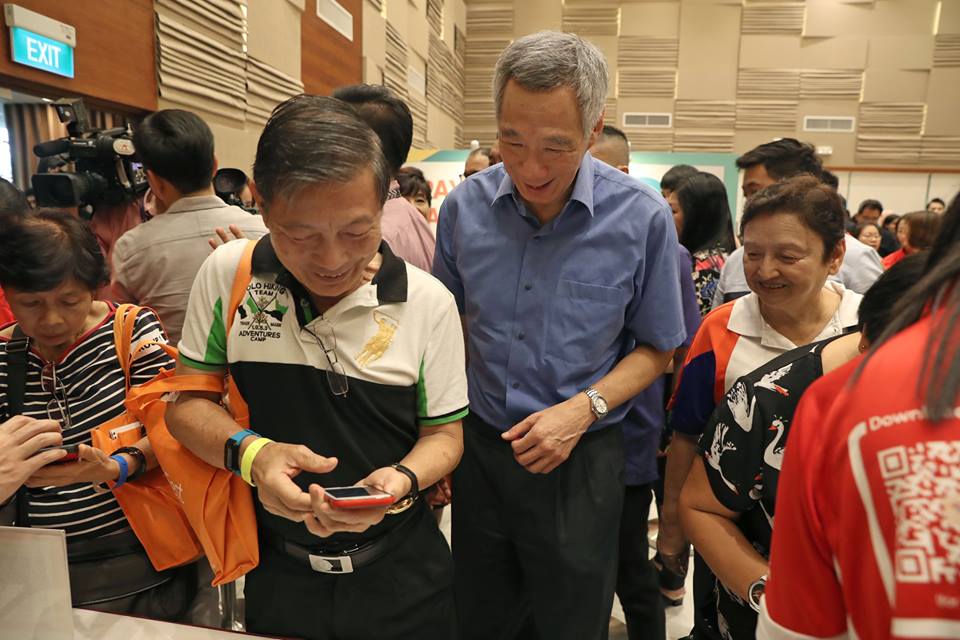Singapore launches Digital Readiness Blueprint to help every last man cross the digital divide
Sign up now: Get ST's newsletters delivered to your inbox

PM Lee Hsien Loong stressed the importance of not leaving behind less tech-savvy Singaporeans as the nation moves towards e-payments.
PHOTO: MCI
Follow topic:
SINGAPORE - Imagine applying for financial help from the Government via an app that can "speak" to an applicant in Chinese, Malay, Tamil or English.
This future is not too far away as plans are underway to develop digital government services in Singapore's four official languages, and explore the use of machine translation technologies until every last man is helped to cross the digital divide.
One-on-one assistance is also being planned to prepare every Singaporean, especially the elderly, to get ready for a digital future controlled by sensors and where cashless payments rule. It will be piloted at some community centres in the latter half of the year.
These are two of 10 recommendations in a Digital Readiness Blueprint launched on Saturday (June 2) at the Infocomm Media Development Authority's (IMDA) Tech carnival held at Suntec Singapore Convention and Exhibition Centre.
Speaking at the launch, Minister for Communications and Information (MCI) S. Iswaran said: "Digitalisation will have a profound impact on our quality of life - it will affect our access to opportunities, services, and social networks. And we want to ensure that no one is left behind in this digital transition."
The Digital Readiness Blueprint, created by an MCI-led workgroup, hopes to improve citizens' access to digital technology and equip them with the skills to use digital technology safely and confidently.
Senior Minister of State for Communications and Information Janil Puthucheary chairs the workgroup comprising 14 other members from the public and private sectors.
The panel also recommended widespread access to "basic digital enablers", such as mobile devices and bank accounts.
Major retail banks in Singapore already waive the $2 fees for children, the elderly, full-time national servicemen and recipients of public assistance when their account balance falls below $500.
But more is going to be done.
The Monetary Authority of Singapore (MAS) is working with local banks to ensure free bank accounts are also available to peoplewith disabilities, former offenders and the chronically unemployed.
"(A bank account) enables every citizen to receive their income electronically and provides access to a debit card to pay for shopping and mobile or Internet banking services...There is still a small segment of the population who do not have bank accounts," said an MAS spokesman.
Two other recommendations are on the need to come up witha set of basic digital skills for everyday activities, and to build resilience in an era of online falsehoods.
The IMDA has begun work on the proposals and will out a series of new courses targeted at the elderly from later this month (June).
The courses, announced in Parliament in March (2018), cover topics from the use of e-payment, chat apps and digital government services to spotting fake news and online scams.
They are an expansion of the official Silver Infocomm Initiative, which has promoted IT literacy among more than 130,000 seniors.
Digital Readiness Blueprint: 10 recommendations
1. Make access to basic digital enablers such as mobile devices, connectivity, bank accounts and digital identity as widepsread as possible.
2. Customise access to basic digital enablers for people with special needs such as those with disabilities, ex-offenders or the chronically unemployed.
3. Spell out a set of basic digital skills for everyday activities. These skills include searching for information on the Web, making cashless payments, using messaging and digital government services, and spotting fake news and online scams.
4. Build media and information literacy by providing resources in Singapore's four official languages on how to spot online falsehood.
5. Ensure children in Singapore are taught the essential values to be responsible cyber citizens and that they can harness technology to benefit their communities.
6. Establish a digital participation pledge for businesses to commit to giving digital literacy training to employees or customers, or participate in official digital inclusion projects.
7. Provide dedicated and regular one-on-one concierge-type help at community centres, public libraries and senior activity centres to impart basic digital skills.
8. Create a Participation Fund to support projects like community apps that connect needy residents to volunteers, in a move to reduce social isolation.
9. Educate and encourage organisations to design their digital services to be inclusive by taking into account people with disabilities, among others.
10. Develop government apps, websites and services in the four official languages to reach out to Singaporeans who do not speak English. Machine translation technologies can also be used to make apps more user-friendly.

